Our bodies house a complex system of processes, chemicals, and hormones that enable them to function correctly. The sex hormone testosterone is a critical aspect of these functions in men, activating puberty and contributing to bone growth, muscle size, sex drive, and sperm production. As men age, testosterone levels sometimes decline, leading to various symptoms that affect the mind, body, and sexual function. This condition is commonly known as Hypogonadism. Testosterone Replacement Therapy (TRT) is an effective treatment for Hypogonadism, but it may cause some side effects, such as acne on TRT.
Benefits of TRT
Testosterone Replacement Therapy may be a highly beneficial treatment for men with low testosterone levels. These include:
- Increased sex drive
- Increased energy
- Improved strength and competitiveness
- Fuller facial hair growth
- Enhanced cognitive function while decreasing the risk of Alzheimer’s
- Decreased inflammation
- Improved mood and mental state
Possible Side Effects of TRT
Overall, TRT can have a positive impact on men with Hypogonadism. Still, a few adverse side effects can occur, such as:
- Gynecomastia
- Increased red blood cells
- Fluid retention
- Accelerated hair loss
- Decreased sperm count
- Acne
However, serious side effects are rare or easy to treat separately.
Dealing With Acne
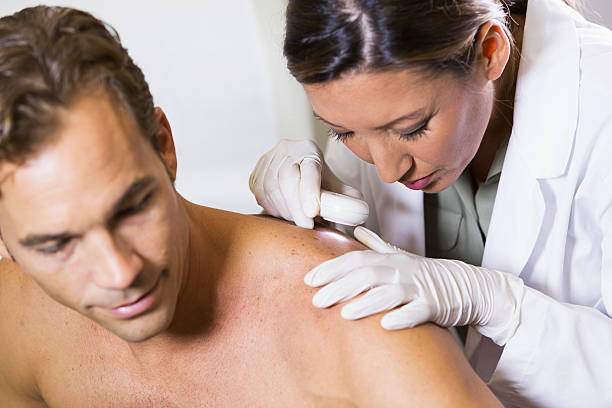
Acne is a common side effect of TRT and can be frustrating to navigate. After all, none of us want to stir up memories of awkward teenage years with pimples and other skin imperfections. Luckily, acne is 100 percent treatable. Don’t let your fear of acne stop you from receiving the immense benefits of TRT.
Why Does TRT Cause Acne?
Typically, we associate acne with puberty. Acne usually occurs due to increased sebum production with increased testosterone levels in the body. For some men, undergoing Testosterone Replacement Therapy can trigger the recurrence of breakouts, especially if they are genetically predisposed to acne. While acne and TRT can go hand in hand, not everyone will experience this side effect.
Acne Solutions
Thankfully, there are many ways to eliminate and prevent acne from TRT. Your healthcare provider can help you find the best solution for your individual needs.
Proper Hygiene (Using Facewash)
The first line of defense against acne on TRT is simple–good, consistent skin hygiene. While it’s easy to get lazy with your skincare routine in adulthood, washing your face with soap each morning and night is essential. It removes excess oils and dirt that can cause pimples, blackheads, and other skin blemishes. Find a face wash that contains Salicylic Acid and/or Benzoyl Peroxide. These chemicals unclog pores and remove bacteria.
Over-The-Counter Medications
You can use many over-the-counter products to treat your blemishes if you find the occasional pimple popping up despite your consistent skincare routine. Ask your doctor if they have any recommendations based on your needs.
Clindamycin Topical
If proper skincare and over-the-counter acne solutions aren’t working for your acne from TRT, your doctor may prescribe Clindamycin, an antibiotic that targets certain kinds of bacteria. Doctors typically prescribe Clindamycin to treat mild to moderate acne. It is usually prescribed as a topical cream. Your healthcare provider may recommend Clindamycin in combination with other oral medications or topical solutions.
Dapsone Topical
It’s another topical acne medication that can be used to treat acne and inflammation. It’s an antibiotic. Dapsone (Aczone) 5% gel is approved by the U.S. Food and Drug Administration (FDA) for the treatment of acne vulgaris in adults and children older than 12 years. A pea-sized amount of dapsone gel should be applied in a thin layer to the acne-affected areas twice daily and rubbed in gently and completely. Topical dapsone gel will decrease the percentage of lesions in patients with mild to moderate acne, especially inflammatory lesions.
Tretinoin Topical
Tretinoin is a vitamin-A derivative often used for men suffering from acne on TRT. Tretinoin is also a topical solution that comes in various forms and strengths. For best results, it is critical to apply Tretinoin consistently at night as it can cause sun sensitivity if used in the day time. During the first few weeks of use, the acne can worsen as the medicine works deep in the skin to prevent pimples from forming. This medication is sometime used as off-label to help with fine wrinkles. Keep track of your results so your doctor can decide if this is the best treatment for your skin needs.
Spironolactone
Spironolactone is a water pill and can be used to help lower blood pressure and treat acne in women who have high testosterone. Spironolactone can be used with oral contraception pills for women who have hormonal acne. It works to fight acne by lowering androgen hormones in the body. It’s available as a topical treatment and a pill. This medication can increase potassium level so it’s best to get your blood test and be monitored by a healthcare professional. Men aren’t prescribed spironolactone for acne because of the side effects because they developed breasts while taking the drug according to the American Academy of Dermatology.
Isotretinoin
If other treatments have not proven effective in eliminating your acne, your doctor can prescribe you an oral medication called Isotretinoin. It is marketed as Absorica, Absorica LD, Claravis, Amnesteem, Myorisan, and Zenatane, and is sometimes referred to by its former brand name, Accutane. Isotretinoin is a retinoid that targets cystic or treatment-resistant acne. Your healthcare provider may prescribe topical solutions on top of this medication to treat breakouts while the drug works. Common side effects include skin dryness and sun sensitivity, so it’s vital to have moisturizer and chapstick on hand and always apply sunscreen for outside activities. It has also serious birth defects and should be taken under close supervision and with a medical provider that’s registered with the iPledge program for monitoring.
Oral Antibiotics
There are other antibiotics your doctor may prescribe depending on your needs and type of acne. The most commonly used oral antibiotic for acne is doxycycline or minocycline. It works to treat infections by preventing the growth and spread of bacteria. It also works by killing the bacteria that infects pores and decreasing a certain natural oily substance that causes acne.
Supplements
Some supplements may be effective in reducing and preventing acne flare-ups. For example, fish oil supplements contain omega-3 fatty acids that can decrease inflammation and the appearance of skin imperfections. Zinc supplements are another possible option for treating acne. Zinc is essential for hormone production, metabolism, cell growth, and immune system support. A 2020 analysis found that those who took zinc supplements saw improvement in their acne.
Home Remedies
You may wonder about possible home remedies to treat acne without obtaining a prescription from your doctor. According to Healthline, there are various ways you can treat acne at home with some basic supplies. Some of these possible solutions include:
- Apple cider vinegar
- Honey and cinnamon mask
- Tea tree oil
- Green tea
- Witch hazel
- Aloe vera
- Follow a low glycemic or low dairy diet
- Reduce stress and increase exercise
Before using any of these home remedies, be sure to do thorough research and consult with your doctor.
Reduce TRT Dosage
Suppose other forms of treatment are ineffective, or you don’t want to take oral medications. In that case, your healthcare provider may recommend reducing your testosterone dosage, mitigating the potential side effects, and improving the appearance of your skin.
Effective Acne Treatment on TRT

While acne and TRT don’t always go hand in hand, it can be a common side effect many men experience. However, you don’t have to let acne get in the way of reaping the full benefits of Testosterone Replacement Therapy from Alpha Hormones. With some basic skincare practices and assistance from your healthcare provider, you can find an acne solution that helps you regain confidence in your appearance.
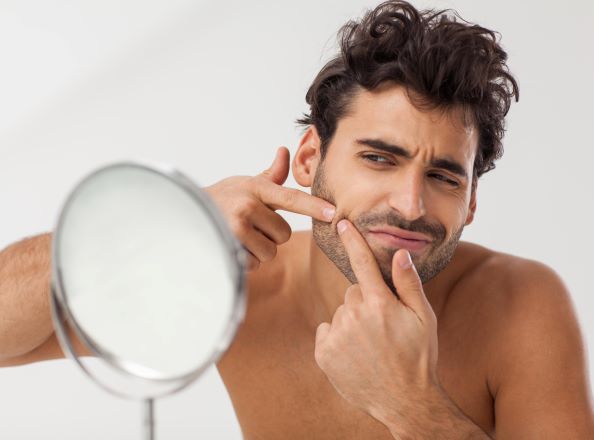

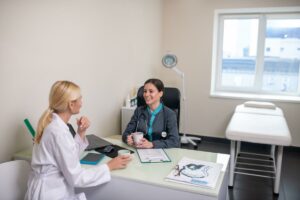

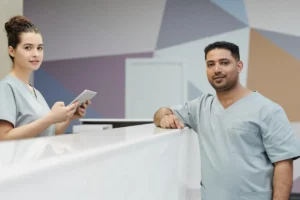






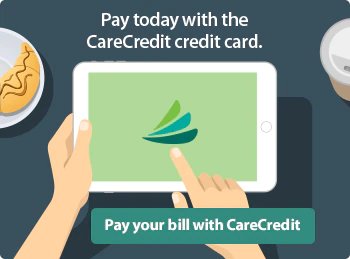

19 Responses
I like the helpful information you provide in your articles. I will bookmark your blog and check again here frequently. I’m quite certain I’ll learn many new stuff right here! Best of luck for the next!
A round of applause for your blog.Really thank you! Keep writing.
Wonderful goods from you, man. I have bear in mind your stuff prior to and you’re just extremely great. I actually like what you have received here, really like what you are stating and the best way through which you say it. You are making it enjoyable and you still take care of to stay it sensible. I can’t wait to read much more from you. This is really a tremendous web site.
Thank you for the sensible critique. Me & my neighbor were just preparing to do some research on this. We got a grab a book from our local library but I think I learned more from this post. I’m very glad to see such fantastic information being shared freely out there.
I liked it as much as you did. Even though the picture and writing are good, you’re looking forward to what comes next. If you defend this walk, it will be pretty much the same every time.
Excellent information was provided. I truly liked reading this piece, and I’m grateful to the author for providing it. Thank you for sharing this blog post. Once again, thanks. Nice.
Thanks to the high-quality content and the administrator’s active involvement, the site’s reputation will undoubtedly improve soon.
I do believe all the ideas youve presented for your post They are really convincing and will certainly work Nonetheless the posts are too short for novices May just you please lengthen them a little from subsequent time Thanks for the post
Simply desire to say your article is as surprising The clearness in your post is simply excellent and i could assume you are an expert on this subject Fine with your permission let me to grab your feed to keep up to date with forthcoming post Thanks a million and please carry on the gratifying work
Somebody essentially lend a hand to make significantly posts I might state That is the very first time I frequented your web page and up to now I surprised with the research you made to create this particular put up amazing Excellent job
This was very enlightening, offering perspectives I hadn’t considered before.
You’ve really gone above and beyond with the research for this article.
You’re so awesome! I don’t believe I have read a single thing like that before. So great to find someone with some original thoughts on this topic. Really.. thank you for starting this up. This website is something that is needed on the internet, someone with a little originality!
Its like you read my mind You appear to know so much about this like you wrote the book in it or something I think that you can do with a few pics to drive the message home a little bit but instead of that this is excellent blog A fantastic read Ill certainly be back
Such a fresh perspective, I hadn’t considered this before.
Awesome blog article.Really thank you! Want more.
“Impressive!”
Wow amazing blog layout How long have you been blogging for you made blogging look easy The overall look of your web site is magnificent as well as the content
you are truly a just right webmaster The site loading speed is incredible It kind of feels that youre doing any distinctive trick In addition The contents are masterwork you have done a great activity in this matter